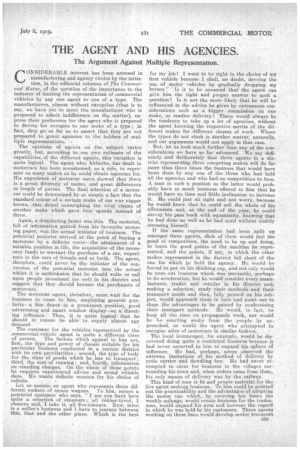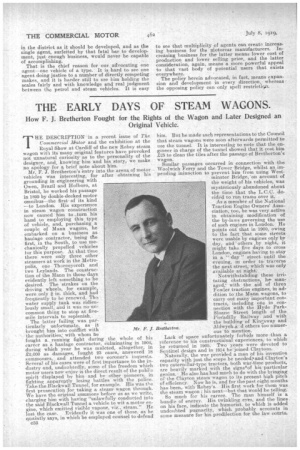THE AGENT AND HIS AGENCIES.
Page 13

Page 14

If you've noticed an error in this article please click here to report it so we can fix it.
The Argument Against Multiple Representation.
CONSIDERABLE interest has been aroused in manufacturing and agency circles by the initiation, in the editorial columns of The Commercial Motor, of the question of the importance to the industry of limiting the representation Of commercial Vehicles by any one agent to one of a type. The manufacturers, almost without exception (that is to say, we have yet to meet the manufacturer who is prepared to admit indifference on the matter), express their preference for the agent who is prepared to devote his energies to ,one make of a type ; in fact, they goso far as to assert that they are not prepared to grant agencies to the holders of mul
tiple representations. , , The opinions of agents on the subject varies greatly, but, according to. our own estimate of the capabilities, of the different agents, this variation is quite logical. " The agent who, hitherto, has dealt in motorcars has been accustomed, as a rule, to represent as many makes as he could obtain agencies for, His experience of motorcar user& showed that there is a great diversity of tastes, and great differences in length of purses. The final selection of a motorcar could be determined by so simple a fact that the standard colour of a Certain make of car was nigger
• brown, this detail outweighing the rival claims of another make which gave four speeds instead of
three. I Again, a dominating factor was this. The motorist, full of information gained from his favourite motorlug paper, was the actual initiator of business. The potential motorist arrived at the point of buying a motorcar by a definite route—the attainment of a suitable position in life, the acquisition of the necessary funds to warrant the purchase of a car, experience in the cars of friends and so forth. The agent, therefore, could never be the initiator of the eonversion of the potential motorist into the actual whilst it is unthinkable that he should write or call upon people prominent (or not) in his district and suggest that they should become the purchasers of motorcarn.
The motorcar agent, therefore, must wait for the business to come to him, employing general publicity—a fine depot in a prominent position, good advertising and smart window display—as a directing influence. Thus, it is quite logical that he should in reason be able to supply almost apy demand. , The customer for the vehicles represented by the commercial-vehicle agent is quite a different class of person. The factors which appeal to him are, first, the type and power of chassis suitable for his particular business conducted in a certain district with its own peculiarities ,• second, the type of body for the class of goods which he has to transport ; third, the cost of running ; and, fourth, information on standing charges. On the whole of these points he requires experienced advice and sound reliable data. He wants definite reasons for his choice of vehicle.
Let us assume an agent who represents three different makers of steam wagons. To him, enters a potential customer who says, "I see you have here quite a selectioe of steamers ; all rubber-tyred, I observe and, I take it, all five-tormers. Now, mine is a miller's business and I have to journey between this, that and the other place. Which is the best for my lob? I want to be right in the choice of my
first vehicle because I shall, no doubt, develop the use of motor vehicles by gradually dropping my horses." Is it to be assumed that the agent can give him the right and proper answer to such a. question ? Is it not the more likely that he will be influenced in the advice he gives by extraneous considerations such as a bigger commission on one make, or readier delivery'? There would always be the tendency to take up a lot of agencies, without the agent knowing the respective merits of the different makes for different classes of work. Where the types do not clash is another matter, naturally, and our arguments would not apply in that case.
But, let us look much further than any of the con siderations we have so far advanced. We say definitely and deliberately that three agents in a district representing three competing makes will do far more than three times the business that would have been done by any one of the three who had held all the agencies and who had no competition to face. A man in such a position as the latter would prob
ably have so much business offered to him that he would have no time and little inclination to increase it. He could just sit tight and not worry, because he would know that he could sell the whole of his allotments and, at the end of the year, he could survey his pass book with equanimity, knowing that he had done as well as he had need without unduly stressing himself.
If the ' same representation had been -split up
amongst three agents, etch of them would feel the goad of competition, the need to be up and doing, to learn the good points of the machine he represented, and the points, if any, in which the other makes represented in the district fell short of the one for which he held the agency. He would be forced to put on his thinking cap, and not only would he nose out business which was inevitable, perhaps to its acceleration, but he would consider every manufacturer, trader and retailer in his district and, making a selection, study their methods and their transport needs and then, fullj primed on his subject, would approach them in turn and point out to them the advantages to be gained by modernizing their transport methods. He would, in fact, be busy all the time on propaganda work, nor would he be courting snubs from the people he aps proached, as 'would the agent who attempted to energize sales of motorcars in similar fashion.
The local ironmonger, for example, would be dis covered doing quite a restricted business because it had never occurred to him to expand his sphere of influence. He had, perhaps, never observed the extreme limitations of his method of delivery by cycle carrier and dawdling boy. He had never attempted to cater for business in the villages surrounding his town and, when orders came from them, his only means of delivery was by the railway. This kind of man in fit and proper material for the live agent seeking business. To him could be pointed out the practicability and the advantages of adopting the motor van which, by covering ten times the weekly mileage, would create business for the tradesman, would expand his area and increase the regard in which he was held by his customers. Three agents working on these lines would develop motor transport in the district as it should be developed, and as the single agent, surfeited by that fatal bar to development, just enough business, would never be capable of accomplishing.
That is the chief reason for our advocating one agent—one vehicle of a type. It is hard to see one agent doing justice to a number of directly competing makes, and it is harder still to see him holding the scales fairly and with knowledge and real judgment between the petrol and steam vehicles. It is easy to see that multiplicity ,of agents can create increasing business for the motorcar manufacturers. Increasing business for the latter means lower cost of production and lower selling price, and the latter consideration, again, means a more powerful appeal to that vast body of potential users that exists everywhere.
The policy herein advocated, in fact, means expansion and development in every direction, whereas the opposing policy can only spell restrictiron.






















